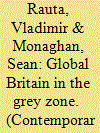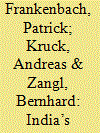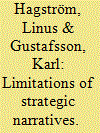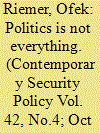|
|
|
Sort Order |
|
|
|
Items / Page
|
|
|
|
|
|
|
| Srl | Item |
| 1 |
ID:
181662


|
|
|
|
|
| Summary/Abstract |
Despite the Lisbon Treaty's modifications in the foreign and security policy domain, the EU has frequently relied on third parties to address external conflicts and crises. Using the Ukrainian conflict as a case study, this article adopts the orchestration model to explain why and how the EU enlists intermediary actors over which it has no formal control to pursue its objectives. It finds that in this conflict the EU outsourced part of its crisis management activities to the Organization for Security and Co-operation in Europe because it lacked the civilian and military capabilities, as well as the regulatory competence and reputation to challenge Russia. Indeed, the Ukrainian case shows that orchestration has emerged as a crucial governance arrangement for the functioning of EU crisis management, raising serious questions about the EU overall capacity to act as a security provider in an international system marred by contestation and hard security concerns.
|
|
|
|
|
|
|
|
|
|
|
|
|
|
|
|
| 2 |
ID:
181661


|
|
|
|
|
| Summary/Abstract |
The United Kingdom’s integrated defense and security review put “grey zone” or “hybrid” challenges at the center of national security and defense strategy. The United Kingdom is not alone: The security and defense policies of NATO, the European Union, and several other countries (including the United States, France, Germany, and Australia) have taken a hybrid-turn in recent years. This article attempts to move the hybrid debate toward more fertile ground for international policymakers and scholars by advocating a simple distinction between threats and warfare. The United Kingdom’s attempts to grapple with its own hybrid policy offer a national case study in closing the gap between rhetoric and practice, or stagecraft and statecraft, before an avenue of moving forward is proposed—informally, through a series of questions, puzzles, and lessons from the British experience—to help international policy and research communities align their efforts to address their own stagecraft-statecraft dichotomies.
|
|
|
|
|
|
|
|
|
|
|
|
|
|
|
|
| 3 |
ID:
181663


|
|
|
|
|
| Summary/Abstract |
In the mid-2000s, India turned from a nuclear pariah of the international community into a de facto recognized nuclear power. Why and how did this status elevation come about? Realist, liberal, and constructivist perspectives point to important motivations but fail to elucidate the process of India’s (re-)integration. Our strategic cooptation argument conceives of India’s status upgrade as an exchange of institutional privileges for institutional support. To stabilize the nuclear non-proliferation regime, the United States and other nuclear powers offered India the privilege of being recognized as nuclear power—and of taking part in international nuclear trade—in return for India’s promise to provide additional support to the non-proliferation regime. This deal materialized because India was able and willing to provide the needed support and because the institutional setting provided favorable conditions for circumventing and overcoming third-party resistance. We thus establish “strategic cooptation” as a mode of adapting international security institutions.
|
|
|
|
|
|
|
|
|
|
|
|
|
|
|
|
| 4 |
ID:
181659


|
|
|
|
|
| Summary/Abstract |
Recent research has explored how the Sino-American narrative struggle around COVID-19 might affect power shift dynamics and world order. An underlying assumption is that states craft strategic narratives in attempts to gain international support for their understandings of reality. This article evaluates such claims taking a mixed-methods approach. It analyzes American and Chinese strategic narratives about the pandemic, and their global diffusion and resonance in regional states that are important to the U.S.-led world order: Australia, India, South Korea, Turkey, and the United Kingdom. While the article confirms that strategic narratives remain a highly popular policy instrument, it argues that their efficacy appears limited. Overall, the five states in question either ignored the Sino-American narrative power battle by disseminating their own strategic narratives, or they engaged in “narrative hedging.” Moreover, even China’s narrative entrepreneurship was enabled and constrained by pre-existing master narratives integral to the current U.S.-led world order.
|
|
|
|
|
|
|
|
|
|
|
|
|
|
|
|
| 5 |
ID:
181660


|
|
|
|
|
| Summary/Abstract |
This article introduces supervised machine learning to the study of German strategic culture, analyzing both how German strategic culture has changed and the impact of strategic culture on Germany's military engagement between 1990 and 2017. In contrast with previous qualitative research on strategic culture, supervised machine learning can yield measurable and empirical insights into strategic culture and its effects at any given point in time over a very long period, based on the reproduction of human coding of a very extensive set of security policy documents. The article shows that German strategic culture has changed slowly and in a nonlinear way after the Cold War, and that strategic culture, when controlling for confounding variables and the temporal order, has a measurable impact on Germany's military engagement. The article demonstrates the analytical value of machine learning for future studies of strategic culture.
|
|
|
|
|
|
|
|
|
|
|
|
|
|
|
|
| 6 |
ID:
181664


|
|
|
|
|
| Summary/Abstract |
Why do states deliberately disclose hard-earned intelligence? For political and operational reasons, Official Public Intelligence Disclosure (OPID) is often considered counterintuitive and ill-advised. However, as this practice proliferates in international affairs in recent years, extant scholarship emphasizes domestic political incentives for its employment. Drawing on interviews with policy, defense, and media figures in Israel, this article generates alternative perspectives. First, in keeping with the dictates of contemporary information and media environment, states engage in OPID as a performative act designed to enhance diplomacy and shape international agenda. Second, in the age of limited wars, instead of being amassed purely for large-scale escalation, selective disclosure of intelligence can be weaponized against adversaries whose operations and very survival depend on secrecy, so as to shape their behavior below the threshold of war. The article advances our understanding of the innovative ways in which intelligence can be strategically employed in the information age.
|
|
|
|
|
|
|
|
|
|
|
|
|
|
|
|
|
|
|
|
|